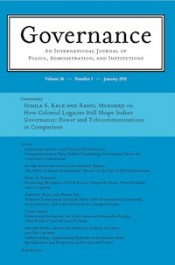Studying accountability in moments of transformation
 In the current issue of Governance, Johan Olsen makes the case for a more sophisticated approach to the study of accountability in government. “A huge literature,” says Olsen, examines accountability in “normal times,” when “it is taken for granted who can call whom to account for what.” Less examined are those moments when fundamental premises about accountability relationships are in flux. We are passing through one of those transformational periods now, Olsen argues, and simple principal-agent models do not help us understand what is happening. His “institution-centered approach” to studying accountability “assumes that the degree of institutionalization of accountability practices is variable and changing.” The restructuring of such practices is shaped by “uncertainty about facts and causality, ambiguous and competing normative standards,” and indeterminate power relationships. Read the article. Olsen is a recipient of the APSA John Gaus Award and the Aaron Wildavsky Award for his contributions to public administration and political science.
In the current issue of Governance, Johan Olsen makes the case for a more sophisticated approach to the study of accountability in government. “A huge literature,” says Olsen, examines accountability in “normal times,” when “it is taken for granted who can call whom to account for what.” Less examined are those moments when fundamental premises about accountability relationships are in flux. We are passing through one of those transformational periods now, Olsen argues, and simple principal-agent models do not help us understand what is happening. His “institution-centered approach” to studying accountability “assumes that the degree of institutionalization of accountability practices is variable and changing.” The restructuring of such practices is shaped by “uncertainty about facts and causality, ambiguous and competing normative standards,” and indeterminate power relationships. Read the article. Olsen is a recipient of the APSA John Gaus Award and the Aaron Wildavsky Award for his contributions to public administration and political science.On the Governance blog, Per Laegreid provides a brief appreciation of Olsen’s article. “Accountability is often studied in stable situations where relationships between actors and forums are rather clearly defined,” Laegreid says. Olsen provides new insights on “how accountability unfolds in disorganized situations where accountability processes are restructured.” Read the note.
